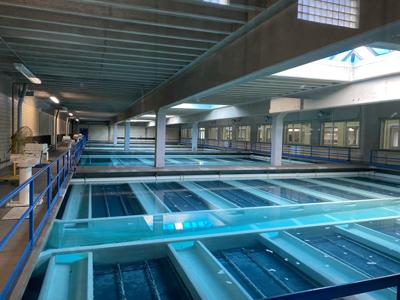WAUKESHA â Waukesha residents can expect to receive Lake Michigan water by late August or early September. As the city inches closer to the water transition, people with pet fish and other water creatures and those on kidney dialysis are asked to take proper precautions.
Waukesha Water Utility General Manager Dan Duchniak said city staff want to get the word out and be proactive so that people are aware of what is happening with the system and changes that are going to made.
"Milwaukee provides service to 860,000 people in the different communities. What we are talking about here is nothing different than what is happening in those communities. Itâs just a change in the dynamics and characteristics of our water," Duchniak said.
City staff want to make sure people are aware of it and understand to be in contact with their health care providers or pet store owners so they can find out what they need to do ahead of time.
"Not after something happens and they come back to us and asking why we didnât you tell us about this ahead of time? We are really trying to be proactive with people and really trying to get them to understand just what those nuances and differences are," he said. Duchniak said one difference is the disinfectant used by the city of Milwaukee versus what the city of Waukesha currently uses. Free chlorine is used in Waukesha as a disinfectant for its distribution system which prevents any bacteria or growth in the water. Milwaukee uses a chloramine or a chlorine ammonia combination.
"They are both widely used throughout the water industry and fully accepted by federal government and regulations," he said.
There are benefits to chloramines if there is a larger system like Milwaukee has. If you are on the extreme of those systems, like Waukesha is, there is definitely a benefit to using chloramines because they last longer in the distribution system, according to Duchniak.
He added it is a benefit to Waukesha to utilize that type of disinfectant here.
âFor kidney dialysis patients, there is a change for their dialysis machine and procedures. They need to understand there is chloramines in the water rather than chlorine in the water,â he said.
Staff has been working with dialysis centers in the city but they understand some residents may not be utilizing kidney dialysis machines or clinics here in Waukesha. If patients are using the machines at home, they need to be aware of the change.
âIt is just change in procedures. Instead of the chlorination you have the chloramination which means the chloramines are out of your water. Which means you have to get not only the chlorine but ammonia out of the water also,â Duchniak said.
Kidney dialysis patients are encouraged to talk to their physician or local kidney dialysis center they work with.
For people with pet fish, reptiles and amphibians, Duchniak wants to make sure they are not impacted by the new water supply.
âThere is not going to be any impact to your dog or cat. What is, is going to be more fish and reptiles and amphibians. Those that live in water and are in and around water,â he said.
Fish owners are being told to contact local pet stores to find out what those changes are going to be.
âIâve had a fish tank and know people in my family that had fish tanks. When my kids were little you had to change out the water and dechlorinate the water before you put the fish back in there. The chlorine can be harmful to the fish,â he said.
If you just dechlorinate the water, you are going to leave the ammonia in the water which can be harmful to those creatures. Fish owners should use a higher level de-chlorinator.
âArea pet stores should be familiar with precautions (inexpensive water treatment or specified carbon filters) to remove chloramines in the new water supply from water for aquariums, reptiles and amphibians. You can tell them that your new water supply will be from the Milwaukee Water Works, which is used by many area communities,â according to the Great Water Alliance website.
Duchniak said the changes are not anything major but just a different way of getting the chlorine and ammonia out of the water.
Have other questions? Visit the transitions page on the Great Water Alliance website: . com/transition/










